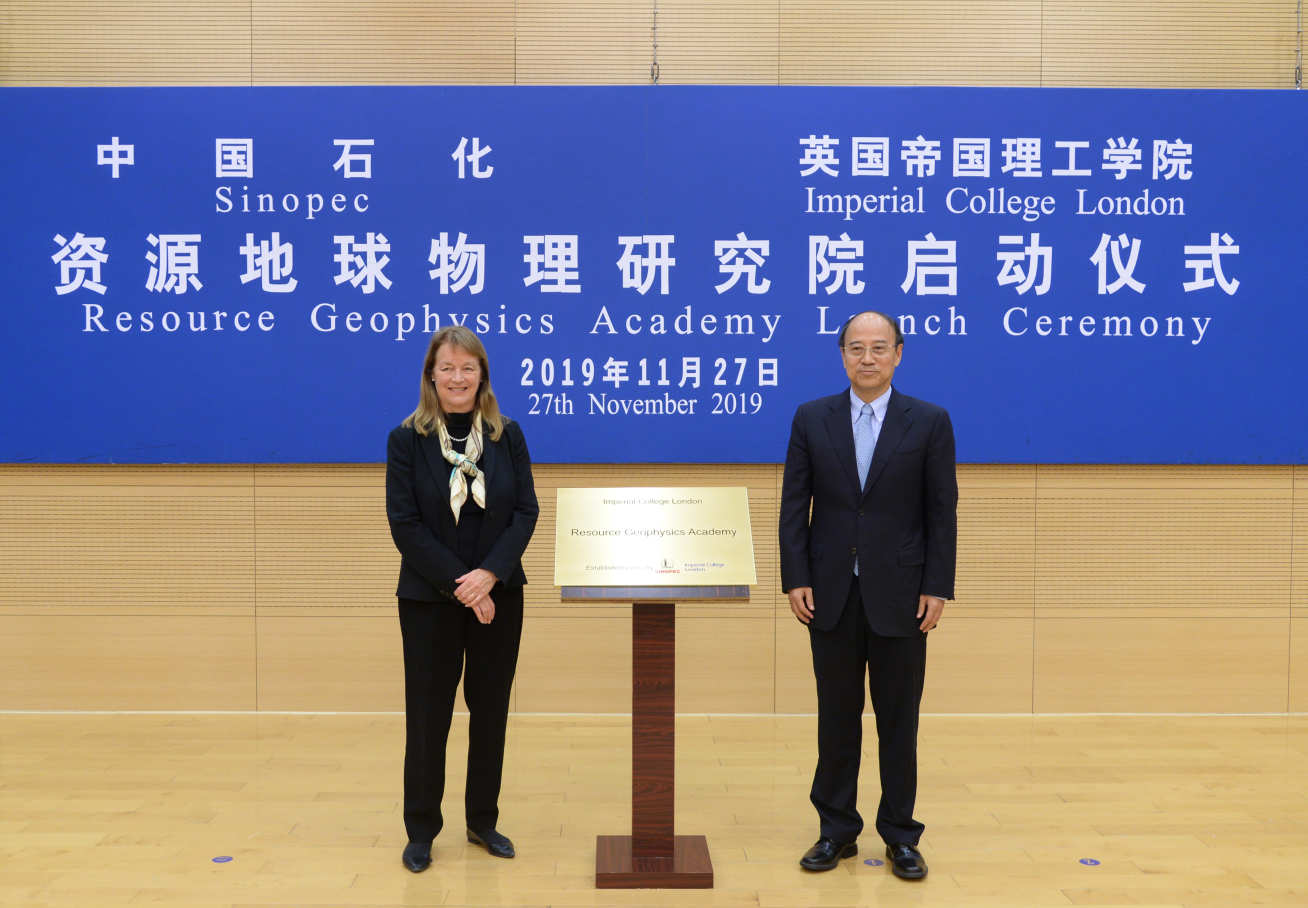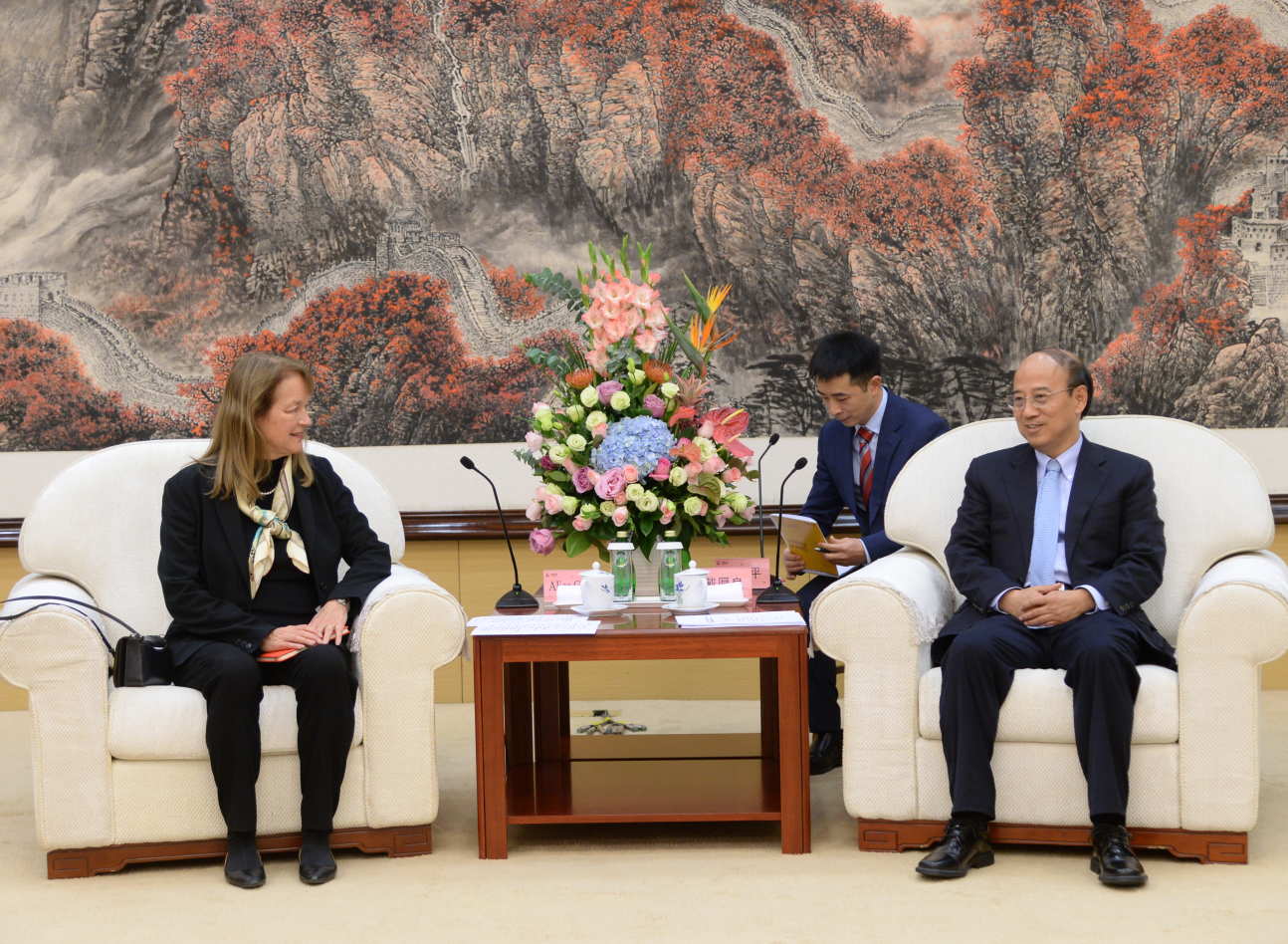£11M academy to train next generation of geophysical engineers


Professor Alice Gast with Sinopec Chair Houliang Dai
Sinopec, one of the world’s largest energy companies, has committed £11 million to establish the Academy.
Imperial’s expertise in applying deep learning to challenges in 3D earth imaging and modelling will create new knowledge, technology, algorithms and solutions for the sector.
The Resource Geophysics Academy was launched at a special event in Beijing this week, attended by Imperial President Alice Gast and Sinopec Chair Houliang Dai.
Mr Yongsheng Ma, the President of Sinopec, and Imperial’s Chair in Reservoir Geophysics Professor Yanghua Wang are the two Principals of the new Academy.
Reshaping geophysics
Yongsheng Ma, President of Sinopec, said:
“Sinopec is excited to be expanding its collaboration with one of the world’s leading international universities, and is delighted that the new Academy at Imperial will help Sinopec to meet its strategic needs in continuing to supply clean energy to the people and industries of China and the world.
“Imperial have world-leading expertise in reservoir geophysics and full-waveform inversion from which Sinopec have long benefited through their collaboration with Professor Wang. The formation of the Academy will allow high-achieving students from China to benefit from and contribute to that activity.”
 Professor Alice Gast, President of Imperial College London, said:
Professor Alice Gast, President of Imperial College London, said:
“Sinopec and Imperial have a history of successful collaboration, with a shared commitment to improving research and training in geophysics. This new Academy will lead to higher quality research and its application across reservoir geophysics and lithospheric dynamics. This new cohort of PhD researchers have the potential to reshape academia and industry in geophysics for generations to come.”
Speaking at the event, Chairman Dai, said:
“Geophysics is at the forefront of hydrocarbon exploration and development. It is also the starting point of the all-encompassing cooperation between Sinopec and Imperial College London, which will extend to midstream and downstream.
“I hope the Academy will serve as a platform for higher and wider cooperation which will contribute to the growth and transformation of the world’s energy and chemical industry.”
Professor Yanghua Wang, co-Director of the Academy, said:
“The Resource Geophysics Academy represents an unprecedented model for industrial collaboration at Imperial.
“It will offer a world class research programme, with a primary focus on equipping the next generation of scientists and engineers in the field with the skills they need to revolutionise the industry.”
Visionary partnership
Professor Mike Warner, from the Department of Earth Science and Engineering, leader of the Full Wave consortium, and co-Director of the new Academy, said:
“Sinopec have supported our work at Imperial in reservoir geophysics and full-waveform inversion for more than a decade.
“The launch of the Academy builds this into a truly visionary partnership designed to advance knowledge and scholarship in these areas to new levels. The Academy will seek to attract and support the best research students from the global community, and to offer them unique opportunities to work at the cutting edge of resource geophysics.”
Beyond PhD studentships, the Academy will also offer opportunities for collaborative research and training for Sinopec employees at Imperial.
The Academy’s two initial research themes will be Reservoir Geophysics, led by Professor Wang, and Lithospheric Dynamics, led by Professor Warner.
The Academy will pioneer advances in the application of geophysics in the exploration and development of hydrocarbon resources, building on an existing industrial Sinopec consortium that has been running for more than a decade and incorporating the current Centre for Reservoir Geophysics.
It will focus on cutting edge research into hydrocarbon reservoirs, their geophysical responses, and how to utilise geophysical data for understanding and detecting such reservoirs.
The Academy will drive understanding of the long-term environmental processes that cause the formation of mountains and sedimentary basins, and the implications of these processes on mineral and hydrocarbon resources. Further research will explore the physical factors that create hazards from earthquakes and volcanoes.
Unprecedented opportunity
Dr Rebeca Santamaria-Fernandez, Director of Industry Partnerships and Commercialisation, Faculty of Engineering – Enterprise Division, said:
“This unique programme is entirely focused on PhD training, giving students direct access to Sinopec’s technical challenges and commercial expertise, while immersed in Imperial’s science and innovation ecosystem.
“This industry-funded Doctoral Training Academy gives unprecedented opportunities for deep collaboration. The Academy will equip engineers and scientists with the skills, knowledge and confidence to tackle the major challenges faced by the hydrocarbon industry. We hope this true partnership will inspire other industries.”
Imperial is the UK’s top STEM research collaborator with China and Imperial academics publish more than 900 research papers with Chinese academics every year.
Earlier this year, Imperial and Tsinghua University launched a new energy research centre – the Imperial-Tsinghua Research Centre on Intelligent Power and Energy Systems.
The Centre will focus on tackling common challenges faced by the UK and China in providing secure, low-carbon power systems.











Responses